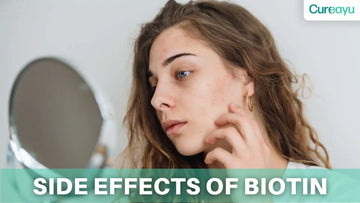Biotin, also known as vitamin B7, is a popular supplement often used to improve the health of hair, skin, and nails. While it is generally considered safe, it's essential to understand the potential side effects before incorporating biotin into your daily routine. In this article, we'll explore the importance and effectiveness of biotin, its sources, and both the positive and negative side effects associated with its use.
Also Read: Essential Guide to Biotin Rich Foods: Top Sources to Boost Hair, Skin, and Nail Health Naturally
What is Biotin?
Biotin is a water-soluble vitamin that belongs to the B-complex family. It plays a crucial role in the metabolism of carbohydrates, fats, and proteins and is necessary for the proper functioning of enzymes in the body. This vitamin also supports healthy energy production, which is vital for maintaining overall well-being.
Importance and Effectiveness of Biotin
Hair Health: Biotin is often touted as a key supplement for enhancing hair quality. Some individuals have reported thicker and more resilient hair following biotin supplementation.
Nail Strength: Those suffering from brittle nails may find relief with biotin, as it may help to fortify and strengthen nail structure.
Skin Appearance: Biotin contributes to the maintenance of healthy skin, potentially helping to achieve a more vibrant complexion.
Metabolic Support: As a vital part of the B-complex group, biotin supports the metabolic processes necessary for energy production and nutrient utilization.
Need for More Research: Despite these potential benefits, further scientific research is needed to conclusively establish biotin's effectiveness in these areas.
Sources of Biotin
Biotin can be found naturally in various foods, making it accessible from dietary sources. These include:
Eggs: A rich source of biotin, especially in the yolk.
Nuts and Seeds: Almonds, walnuts, and sunflower seeds are excellent plant sources of biotin.
Legumes: Foods like lentils and peas contain significant amounts of biotin.
Whole Grains: Oats and barley provide biotin, along with fiber and other nutrients.
Organ Meats: Liver and kidney rank high among biotin-rich animal products.
Vegetables: Sweet potatoes, spinach, and broccoli offer biotin along with various vitamins and minerals.
Biotin is also conveniently available as a dietary supplement in capsules, tablets, and powders, making it easier to incorporate into your routine if dietary sources are insufficient.
Also Read: 6 Best Supplements for Glowing, Healthy Skin
Positive Side Effects of Biotin
Improved Hair Health: Many users observe thicker, shinier hair, with reduced shedding over time, signaling improved hair health.
Stronger Nails: Regular intake of biotin may make your nails less prone to splitting and increase their overall durability and thickness.
Enhanced Skin Appearance: For some, biotin contributes to smoother and clearer skin, potentially alleviating minor skin concerns like dryness or irritation.
Negative Side Effects of Biotin
Digestive Issues: Some individuals might experience mild digestive discomfort, such as nausea, bloating, or diarrhea, especially when consuming high doses.
Skin Rashes: Though uncommon, biotin can occasionally trigger skin rashes or unexplained itching, urging discontinuation and consultation with a healthcare professional.
Interference with Lab Tests: Biotin has been known to skew results in certain lab tests, including those for thyroid function and heart troponin. Inform your doctor about any biotin supplementation to avoid diagnostic inaccuracies.
Interactions with Medications: Biotin may interact with medications like anticonvulsants, potentially reducing their effectiveness. It's crucial to discuss your biotin intake with a healthcare provider if you're on medications.
Final Words
While biotin is generally considered safe and may offer benefits for hair, skin, and nail health, it's crucial to be aware of the potential side effects. If you experience any adverse reactions after taking biotin supplements, discontinue use and consult your healthcare provider. As with any supplement, it's always best to obtain nutrients from a balanced diet whenever possible and to speak with a qualified healthcare professional before starting any new supplementation regimen.








